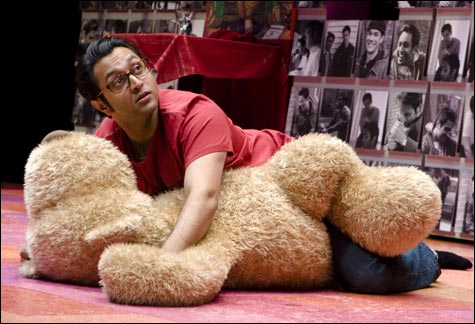
THE FOUR OF US: Is that sex-toy bear the key to Ben’s $2 million advance? |
Itamar Moses takes the buddy vehicle and twists it early and often in The Four of Us, a smart meta-theatrical comedy that opened Off Broadway in March and has already made it to Merrimack Repertory Theatre (through May 11). For starters, the play is a two-hander; the other two title entities are either the characters’ egos or the selves they used to be. We meet fledgling playwright David and first-time novelist Benjamin at a celebratory lunch — Benjamin has just sold his first book. But these two twentysomethings met each other at a summer camp for rock-star wanna-bes, becoming fast friends at 17. Having traded in one kind of keyboard for another, the two now literary lights aspiring to flicker have continued to support each other — until Ben’s switch is suddenly cranked up to mega-wattage. Dave is all congrats until the sale price for Ben’s tome is announced: $2 million. Dave’s first reaction is to spew the water he has just sipped all over his friend. His second is to wonder whether such success and lucre won’t be “totally spiritually corrupting.” And so the worm begins to turn.
The Four of Us has garnered attention in part due to speculation that it is a poison pen aimed at long-time friend Jonathan Safran Foer, whose 2002 tome Everything Is Illuminated did indeed garner the kind of cash and acclaim that might make a still-struggling pal gag. The play almost certainly is inspired by the Moses/Foer alliance, right down to the optioning of Foer’s first book by a famous movie star (Liev Schreiber). But this cleverly constructed dual portrait of the artist is no attack. It’s an engaging series of snaps of two gifted, still maturing guys caught in the flux of confidence and self-doubt. That one is the tortoise, stolidly bent on the finish line, and the other the hare, running the race in part to wave to the crowd, hardly reflects badly on the guy in the shell.

Moses’s previously best-known work is the historically inspired, fugue-structured Bach at Leipzig. This one is a hipper cousin of Donald Margulies’s elegant portrait of literary mentor and mentee, Collected Stories. But Moses works into the dynamic between creative friends an interesting discussion of the inwardness of fiction writing versus the sometimes dauntingly collaborative process of writing for the stage that includes a wish-fulfillment fantasy in which the young-playwright character, melting down in the wake of a badly received regional-theater production, denounces the folks who’ve just put on his play as a “gantlet of morons.”
Sub-themes and self-reflexiveness aside, the exchanges of the flakier Dave and the more abrupt Ben, which dart backward and forward over the course of 10 years, are edgy, bright, and often touching. Moreover, they sound like conversation — if, in the case of parallel scenes involving left phone messages and Q&A, stunted conversation. And the device of the last several scenes, in which the play we have been watching becomes a sort of play within the play, is a very neat trick (nicely realized in the MRT production). If the 90-minute work has a flaw, it is that it backs away from the tough territory occupied by the green-eyed monster and opts for a nostalgic piquancy instead.
Kyle Fabel directs the slick MRT staging on a set by Bill Clarke that takes its cue from a scene in which David and Benjamin meet in the apartment of the film star who has optioned Ben’s book, its walls covered with pictures of its famous occupant. The walls of the MRT set are a dense collage of photos — albeit small — of the actors playing Dave and Ben, alone and together. Tucked into this wallpaper of ego versus alliance are a few cubbies, one serving as a mini-closet, another housing a large stuffed bear that at one point becomes a spongy sort of FAO Schwarz sex toy. Jed Orlemann makes a charming, goofy yet self-aware David, plagued by a Dave Eggersy tendency to watch rather than inhabit his life. And Bhavesh Patel, as the more directed, pop-culture-proof Ben, nails a self-assuredness that borders on the boorish. It’s hard to imagine these two clicking, but then literature abounds with strange bedfellows. Moses takes a hard, light look at what happens when one gets all the covers.
The spin in Spin is less redolent of the campaign trail (though there is that) than of As the World Turns if the soap’s writer were David Mamet. There is promise in the main character of Robert William Sherwood’s 2000 political satire: a driven pig of a campaign manager whose comfortable lead in the run-up to the New Hampshire primary is threatened by scandal. But the depressive presidential candidate and his waxen “wife with a past” are up to their ears in suds. And that threatens to send the show, which is getting its Boston-area premiere from Zeitgeist Stage Company (at the Boston Center for the Arts Plaza through May 10), right down the drain.